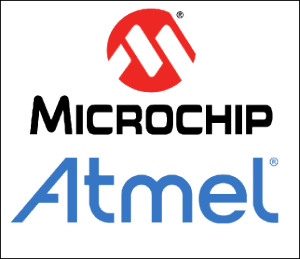Microchip purchased Atmel – Some background and what this could mean to the Maker community
 Traditionally if engineers needed a small microcontroller that was easy to use and program, they would likely choose a Microchip PIC. A design was still required to couple the microcontroller together with a power supply, clock, and I/O, but that was relatively simple for any engineer. The software was a little more difficult since the PIC was programmed using Microchip RISC assembly language.
Traditionally if engineers needed a small microcontroller that was easy to use and program, they would likely choose a Microchip PIC. A design was still required to couple the microcontroller together with a power supply, clock, and I/O, but that was relatively simple for any engineer. The software was a little more difficult since the PIC was programmed using Microchip RISC assembly language.
This was less useful to the Maker community, who could understandably find hardware design and the Microchip PIC environment to be very confusing.
Then in 1992 the Basic Stamp 1 by Parallax came along. This device used a Microchip PIC on a small circuit board with its own clock, I/O, and power supply. It also had FLASH memory. The PIC ran an interpreter program, and the user could program it in a version of Basic (PBASIC). The most important aspect of the Basic Stamp is that it allowed the fledgling Maker community to create real microcontroller-based projects. But the Basic Stamp has always been too expensive for Makers.
In 2005 the Arduino was invented as a lower cost alternative to the Basic Stamp. Based on open-source hardware Arduino boards could be manufactured by anyone. It was originally designed to use the ATMEL AVR microcontrollers, and this tradition has continued on from 8-bit to 16 and 32 bit AVRs. Manufacturers have created Arduinos based on different microcontrollers too, which isn’t a problem as long as the board is compatible with the Arduino IDE and libraries.
Arduino boards have a wide range of abilities and features and can be programmed in multiple languages. A simple Arduino board can be purchased for under $20. These features make the Arduino a very handy device for the Maker community.
Microchip is still the 800-pound Gorilla in the microcontroller and memory marketplace. And this marketplace has been consolidating as margins grow tighter. Microchip just purchased Atmel for $3.6 billion.
What does this mean for the Maker community?
Microchip has always tried to be attractive to the Maker community. Its parts are very inexpensive, and it provides explicit guides of “how to” build a complete circuit board based around its PIC microcontrollers. For a while the Maker community seemed to be moving toward Microchip, with books like “Easy PIC’n” becoming somewhat popular. Microchip had a market share in the Maker community as long as they were competing with the Basic Stamp and its expensive counterparts. That seemed to fall away when the Arduino arrived.
Microchip, along with Digilent and Fubar Labs, decided to create their own open source hardware platform to compete with the Arduino and Raspberry PI. Billed as “Arduinos on Steroids” this platform is called the chipKIT, and it uses the very powerful PIC32 series of microcontrollers as its engine. The chipKIT boards were introduced in 2013 at $20 for the low-end boards. These boards were supposed to be able to port code created for the Arduino right into the chipKIT.
However, increased raw power and a different microcontroller have created problems with library compatibility. This isn’t a big problem for programmers who are used to tweaking libraries for their own use, but the Maker community values greater compatibility and ease of use, and many do not have a need for the power available in the chipKIT. The chipKIT has a decent market niche, but the Maker community really loves Arduino.
Now that Microchip owns chipKIT and Arduino, it will be interesting to see if a pathway is created to urge Makers on to more powerful products. A partial pathway already exists since chipKIT can be programmed with either the Arduino IDE or with MPLAB and its In-Circuit Debugger.
Microchip shines with excellent product support and online designer forums. But these tend to cater to engineers more than Makers. ChipKIT questions do not get the immediate response that other PIC questions elicit. Some engineers on the Microchip forums have a dismissive attitude toward the Maker community too.
It would be to Microchip’s advantage to create a Maker community forum as part of their otherwise excellent forums, with Maker-friendly moderators and assistance. They could combine this community with the Arduino and the chipKIT Makers. Maybe Makers can be encouraged to join the engineering career fields.
From a personal note – I’ve always loved the Microchip PIC, and have programmed it in RISC and C++. I’ve also programmed the Arduino in C++. If Microchip can make the libraries easier to use, the PIC32 has some serious power I’d love to play with in an Arduino environment.
